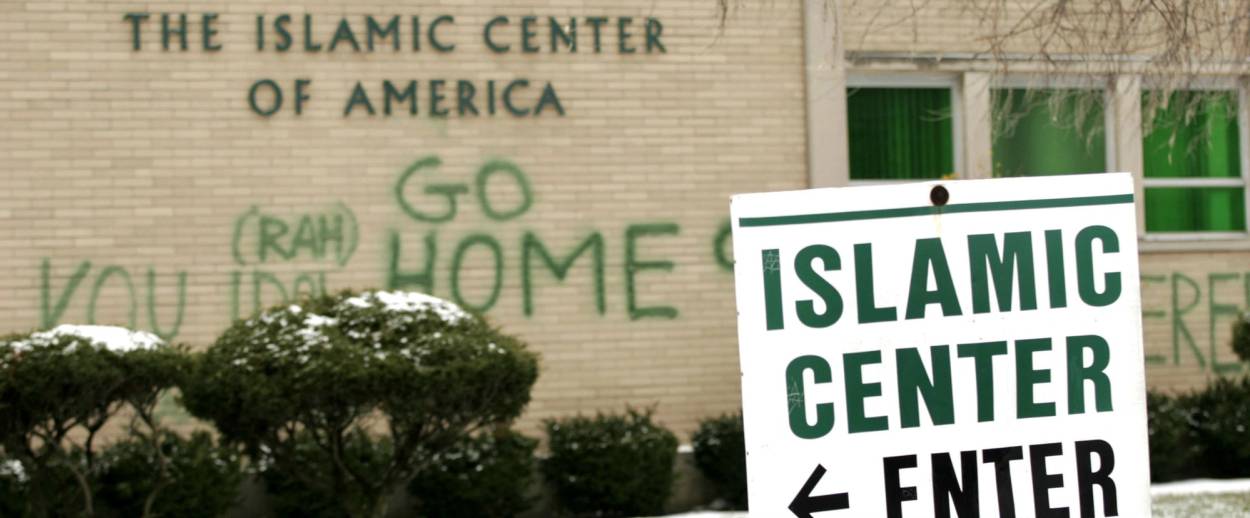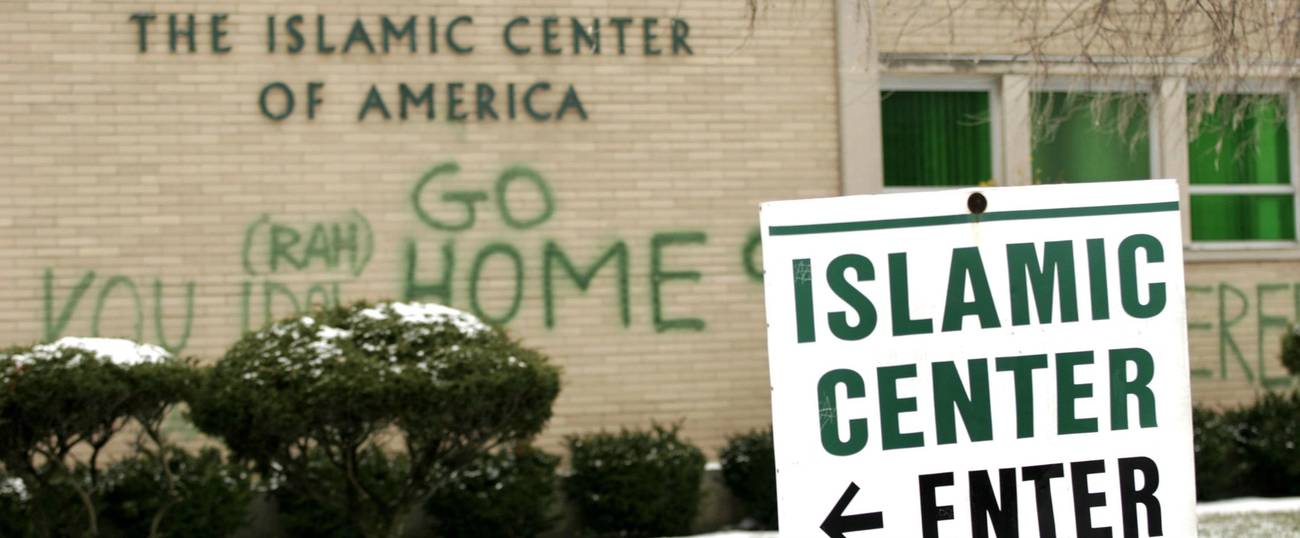For Jews, The Fight Against Islamophobia Must Begin At Home
Trump and his allies are attempting to play Jews and Muslims against each other by exploiting prejudice from within our community and without. We must fight back.




Following the announcement of Donald Trump’s “travel ban,” which slashed America’s refugee resettlement program and blocked Muslim citizens of several Muslim-majority countries from entering the United States, I felt a rush of pride as I signed the name of Brown Students for Israel, which I was leading at the time, to the Greater Boston Area Jewish “Communal Joint Statement on Immigration and Refugees.” It was a relief to see the major Jewish institutions of my home community, like Boston’s Federation (the Combined Jewish Philanthropies) and the Hillel Council of New England, “reject any effort to shut our nation’s doors on the most vulnerable.” The national Jewish effort was no less impressive.
Indeed, American Jews can take pride in much regarding our role in confronting Islamophobia in this country. There is also, however, room for our community to improve. Now that Muslims in the United States and abroad have become such high-priority targets of the American government, we must be all the more attentive about our attitude toward our Muslim American neighbors. We are at a crossroads—we can choose to allow ourselves to be tools of the new divisive political order, or we can fortify our community against Islamophobia and prepare to resist efforts to play us against Muslims.
***
Donald Trump placed Islamophobia at the center of his campaign, and his presidency has already wreaked havoc on both the American and the Southwest Asian Muslim communities. Muslim Americans (like Jews) have witnessed a spike in hate crimes, including mosque vandalism and racist fliers. Abroad, Trump’s lax attitude toward military operations and his open lack of concern for civilian casualties (during his campaign, he even called on the military to intentionally kill the family members of terrorists) have led to increases in civilian casualty rates in Syria, Iraq, and Yemen since he took office. And of course, the infamous “travel ban” seeks both to curb the inflow of Muslim refugees to the United States and to minimize the number of Muslim immigrants in general.
This situation creates obvious perils for Muslims. But it also risks conscripting Jews in the service of prejudice. Simply put, the American Jewish community is in danger of becoming an instrument for defending bigotry. Legitimate Jewish and Israeli concerns about anti-Semitism and anti-Zionism are being marshaled to justify policies repressing Muslims. We must not let that happen without challenge.
How are American Jews used as a weapon against American Muslims? To begin with, due to the Israeli-Palestinian conflict, Jews and Muslims are too often pitted against each other in the popular imagination. Geopolitical challenges over the last century have been spun into myths of an “ancient hatred,” such that the conflict has taken on a timeless and universal quality for many. To side with one religious community is to be against the other. We easily forget how localized and modern this conflict is—even the BILU Manifesto, a crucial Zionist document inked as late as 1882, proposed Zionism as a cooperative Jewish-Muslim venture, addressing the sultan with an offer “to help our brother Ishmael in his time of need” by supporting Ottoman foreign policy objectives. But today, far-right politicians nonetheless justify their anti-Muslim policies by claiming to be acting in defense of Jews or Israel.
The concept of the so-called “Judeo-Christian tradition” has further cemented the idea that Jews and Muslims are on opposite sides of a long-term rivalry. Christian political figures with their own histories of anti-Semitism have long used the term as part of their rhetorical toolbox. The idea of a “Judeo-Christian tradition” would have come as news to generations of Christian anti-Semites who saw their faith as superseding a backward Judaism. Nevertheless, the phrase has taken root, and served to categorize Judaism and Christianity as somehow especially similar—and unlike Islam.
Such flawed assumptions have found their expression in the claim that today’s refugees from Muslim-majority countries are particularly likely to be anti-Semitic by virtue of their religion or national origin. It is that narrative to which Morton Klein of the Zionist Organization of America (ZOA) gave voice when he broke from the American Jewish establishment to support the “travel ban,” saying of his group that, “we strongly support President Trump protecting the security of Americans and Jews by not allowing Muslims whom we can’t vet, and who have disproportionate tendencies towards terrorism, and who are infested with [Islamic State] supporters, to come to America.”
Right-wing leaders have similarly used women and LGBTQIA+ people to justify Islamophobic immigration and refugee policies in much the same way. But Trump’s decision to sign his “travel ban” on Holocaust Remembrance Day, which commemorates a genocide that the Jews suffered because America and other countries closed their borders to Jewish refugees, should be a clear sign to all American Jews that such actions are not taken with any sensitivity to Jewish needs.
By exploiting the Israeli-Palestinian conflict, promoting a false idea of Judeo-Christian theological or cultural unity, and steamrolling Jewish refugee history in order to stoke fear of contemporary Muslim refugees, Trump and his followers can and will try to manipulate the American Jewish community into supporting their agenda. If we fall for those tricks the way that people like Morton Klein have, we will become tools for the advancement of an abominable mission to put down other religious, ethnic, and national minorities.
***
The very hard truth, moreover, is that this is not only a challenge for the future. Many Jewish communities and spaces in the United States already have an Islamophobia problem.
While the ZOA is a frequently cited example, it is far from the only site of American Jewish Islamophobia. I’ve noticed speakers at synagogues occasionally slip into the same essentialist orientalist tropes that Christians have long used to conceptualize Jews as well as Muslims. Jewish conference lectures sometimes wander into problematic territory. Moreover, the Jewish community has produced some extremely troubling public figures. Inside the administration, there is Trump’s trusted aide Stephen Miller, one of the chief architects of his bigoted policies and pronouncements. Outside the White House, there is Sheldon Adelson, who has supported a number of Islamophobic politicians’ campaigns—including Trump’s. And Pamela Geller, whom the Southern Poverty Law Center describes as “the anti-Muslim movement’s most visible and flamboyant figurehead,” is yet another shonda.
These people are exceptions to the overwhelmingly progressive American Jewish mainstream. Nevertheless, no Jew who strays so far from the path of justice can be dismissed—all must be addressed as symptoms of a very real Islamophobia problem. Somehow, despite all of our teaching about Tikkun Olam and the lessons of Jewish history in Hebrew schools and at summer camps, people are still slipping through the cracks.
As citizens, as Jews, and as human beings, our community has a responsibility to stand up for all marginalized people. In this moment, with Islamophobia both on the rise and on the presidential agenda, American Jews have a special responsibility to self-examine, to recognize our flaws as well as our accomplishments, and to challenge ourselves to improve. We must ponder the ways in which our community is vulnerable to being used as a tool against Muslims, and we must resist that effort in every way we can.
Benjamin Gladstone studies Judaic Studies and Middle East Studies at Brown University and has written for the New York Times, The Forward, and The Tower, among other publications.